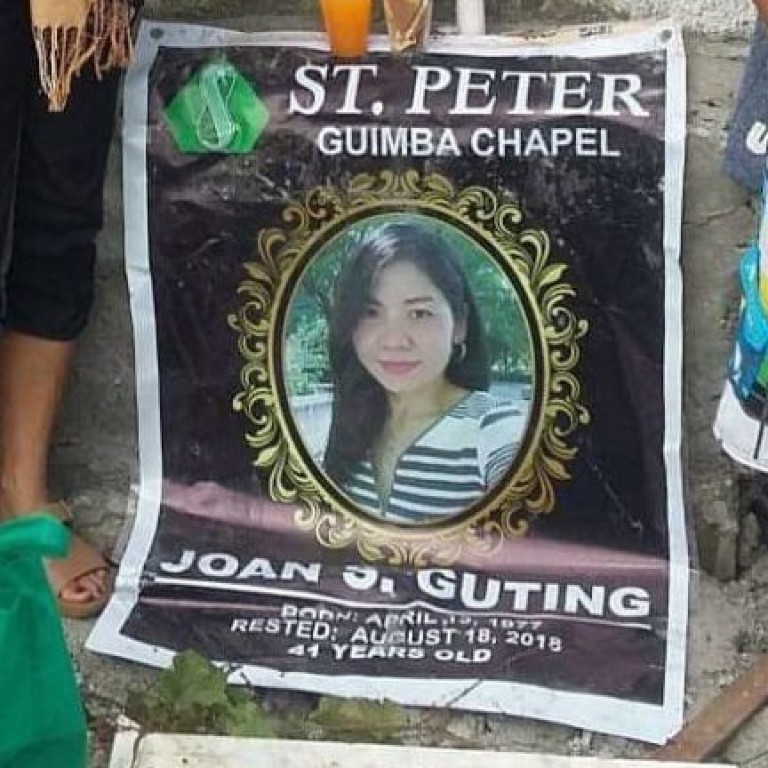
‘Justice for Joan’: Supporters of Filipino domestic helper who died of cervical cancer face legal hurdles in fight to ‘restore her dignity’
- Joan Guting, who had late-stage cervical cancer and acute renal failure, was forced out to the streets in May 2017 after her employers suddenly dismissed her
- Eight months after her death, Guting’s supporters are trying to seek damages for discrimination but say they face obstacles after the Legal Aid Department revoked legal aid for her case
It was past midnight, Guting was severely ill – she had been diagnosed with advanced cervical cancer and acute renal failure – and she had nowhere to go.
“When she called me, she was just crying and saying she needed help. She couldn’t really talk,” recalled Carla Temporosa, a domestic worker who has been in the city for 18 years.
Guting died last year before she could see the results of a discrimination case against her employer. Her supporters are still pushing for it, but they have faced hurdles in obtaining legal aid.
Worst domestic worker abuse cases of Hong Kong, Singapore and Malaysia
“This is to restore dignity to her even after her death and to provide damages to her [three] surviving children,” lawyer Michael Vidler said.
“It is also to build up a body of case law, so people can know that if they behave in this manner, they can expect to face discrimination action,” he said.
“Some employers seem to believe that all they can face is a Labour Department action for unlawful dismissal. They have to pay one month salary and then they are fine. But in these circumstances, where there was discrimination, other factors apply and substantial damages have been awarded.”

According to Vidler, this was a case of discrimination because she had been fired on the grounds of her disability after her employers became aware of her illness.
The Post tried to call Guting’s employers multiple times but was not able to reach them.
The domestic worker’s request for legal aid had been granted on the basis that there were merits to the case in July last year. But after her death the following month, the decision was overturned.
Why domestic workers are slaves of Asia’s big cities
This happened even though Guting had granted “power of attorney” to Temporosa – a legal document giving one person the power to act for another – and a will to ensure continuity of proceedings upon death.
“I don’t know why they took it back. This makes us really sad and frustrated,” Temporosa said. “I still hope we can get it, but what I feel is that there is no justice for people like us in Hong Kong.”
In the meantime, Guting’s supporters have filed an appeal against the Legal Aid Department’s decision. Proceedings began on Wednesday at the High Court, but the hearing was adjourned to await further submissions.
The night she was dismissed, Guting took a taxi to a police station where Temporosa went to meet her. They sought help but the police officers said the issue was not under their jurisdiction, Temporosa said.
“I called her employer that night and he told me that what they did was legal … Regardless of being legal or not, that was inhumane,” she said.
At the time, Guting was going through radiotherapy and had renal drainage bags inserted into her kidneys, Temporosa said. “What if I could not meet her? What could have happened to her, extremely ill and carrying a bunch of luggage?”
Temporosa took Guting to a church. Guting then spent a few days at a hospital before going on to stay at the house of Temporosa’s employer, who agreed to help.
The invisible struggle: how thousands of female migrant workers lose their money and their children every year
“She really needed someone to look after her. But she was not a complainer. In fact, during that time, I cried more than her,” Temporosa recalled.
“Every morning, I would wake her up and she would play the guitar and sing religious songs. She was dying but she had such an extraordinary strength,” said the domestic helper, breaking into tears. “She always had hope in her heart to carry on because of her three children.”
The children, aged between 11 and 17, are now being cared for by Guting’s mother and sister in the Philippines.
“They were victims and Joan [Guting] was a victim too, because we don’t really have a choice but to work in other countries and leave our children behind,” Temporosa said.
Guting, who was a domestic helper in Hong Kong for about three years after working in the Middle East, returned to the Philippines in October 2017. “She had already received most of her medical treatment here and she wanted to see her children,” Temporosa said.
Filipino domestic worker in Hong Kong fired after employer found out she has cervical cancer
Vidler said there was a reluctance from the Legal Aid Department to provide support in such cases.
“It’s horrific how someone in Hong Kong, that family in particular, can [treat] someone who has late-stage cancer and turf her out in the streets at night, with nowhere to go,” the lawyer said.
“And because of Legal Aid’s attitude, they seem to get away with it, unless you have someone prepared to stand up for [the applicants],” he said.
“I have encountered, on numerous occasions, resistance by the Legal Aid Department to grant legal aid in discrimination cases, often for reasons such as that [the applicants] won’t get significant sums of money, or because they rely on facts presented by the other side,” Vidler said.
“Then we have to go through an appeal – all pro bono – to get legal aid for these people. The number of times we experience this leads me to believe that there seems to be an unwritten policy of not granting legal aid, and basically to test if the applicants will proceed further and file an appeal,” he said.
Filipino’s cancer ordeal underlines the plight of domestic helpers in city
A spokesperson for the Legal Aid Department, Kitnacy Wong, said Vidler’s allegations were “totally unfounded and contrary to the facts”.
“The policy objective of legal aid is to ensure that no person with reasonable grounds for pursuing or defending a legal action is denied access to justice because of a lack of means,” Wong said.
“The Legal Aid Department processes all the legal aid applications, including applications for discrimination cases, in accordance with established principles and procedure,” she said.
To determine whether there are reasonable grounds for legal aid to be granted, Wong said, the background of a case, evidence available and the legal principles applicable to the case are considered.
However, the spokeswoman said no comments could be provided on Guting’s case due to privacy reasons.
Guting’s supporters, meanwhile, are still hopeful justice will prevail.
“I hope we can still make justice for Joan [Guting] and also for her children,” Temporosa said. “The protection in Hong Kong is so weak for us. I hope that the government here can do more and that employers start to look at the other side, and be more considerate.
“They should remember that their helper is a human being, just like them.”

